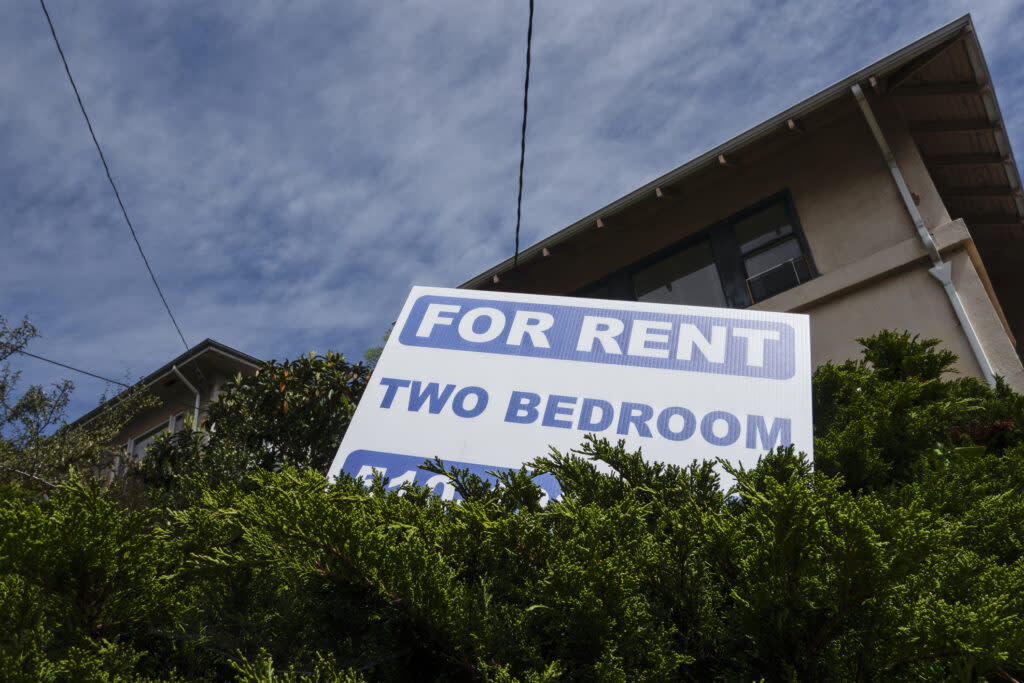Idaho bill to remove local rent protections sent to governor

- Oops!Something went wrong.Please try again later.
According to statistics from Jesse Tree’s 2023 annual report, eviction rates in the Treasure Valley have nearly doubled from 2022 to 2023. (Getty Images)
A bill that ends Boise’s Section 8 and rental application fee ordinances is headed to the Idaho governor’s desk after passing both legislative chambers.
House Bill 545 passed the Senate in a 26-9 vote Monday afternoon.
Sen. Doug Okuniewicz, R-Hayden, opened the debate, noting that its purpose is to prevent local governments from enforcing local rent control ordinances.
“A local government unit shall not enact, maintain or enforce an ordinance or resolution that would have the effect of mandating Idaho property owners to be forced to participate in an optional Federal Housing Assistance Program, or any other program or law that would otherwise regulate rent fees or deposits charged for leasing private residential property,” according to the bill.
“It’s simply trying to make sure that a city or county can’t require you to lower your rent at your rental property,” Okuniewicz said. “That’s it in a nutshell.”
The bill comes after the Boise City Council in the fall approved an ordinance blocking landlords from denying rental applications based on their source of income, including a Section 8 housing voucher, child support or any type of income, Boise Dev first reported.
Many Idaho landlords testified in favor of the bill during the testimony process, arguing they should not be forced to accept federal housing vouchers by cities. Meanwhile, Boise City Council member Jimmy Hallyburton testified that the ordinance that inspired the bill was crafted to ensure people with Section 8 vouchers would not face discrimination from property management.
Sen. Ali Rabe, D-Boise, at the State Capitol building on Jan. 8, 2024. (Otto Kitsinger for Idaho Capital Sun)
During the floor debate, Sen. Ali Rabe, D-Boise, said she feels the bill is targeting her city and the people she serves every day. Rabe is the executive director of Jesse Tree, a Boise nonprofit aimed at preventing homelessness and eviction.
“The passage of this bill will cause more of my neighbors to lose their housing,” Rabe said. “Housing is a huge problem in a lot of cities in Idaho, including my city, and quite frankly, this bill is going to preclude elected officials’ ability to address their housing crisis in a lot of different ways.”
According to statistics from Jesse Tree’s 2023 annual report, eviction rates in the Treasure Valley have nearly doubled from 2022 to 2023. Last year, there were 2,040 eviction filings in the Treasure Valley — a 950 increase from 1,090 eviction filings in 2022.
“If this bill passes, more people will end up homeless,” Rabe said. “I just think it’s unfair that the state continues to step in and tell my city, tell my community or other communities across the state these are inadequate ways for us to address the issues that we’re facing daily.”
Sen. Abby Lee, R-Fruitland, also opposed the bill. Lee recalled an incident a few months ago in which residents of a mobile home community in her district faced up to a $600 increase in rent after an out-of-state investor purchased the property. Despite pleas from her constituents to intervene, Lee declined, citing it as a matter best addressed locally.
“This is a local issue, and this is an issue where communities need to make their decisions,” Lee said. “I think that we are missing an opportunity to allow our local communities to do the things that they need to do under the auspices of this kind of central government who knows what’s best for each of these local needs.”
Senate Pro Tempore Chuck Winder, R-Boise, debated in favor of the bill. Winder, who has experience in commercial real estate, said he believes the state does have the authority to intervene when it thinks it is appropriate.
“If you eliminate the ability of the investor to invest and have a reasonable return on their investment, they’re going to walk out of your markets,” he said. “We do have a problem here, and I think we do need to get our collective heads together and figure out how we deal with some of these things, but I don’t think rent control is one of the answers.”
The bill already passed the House of Representatives in a 59-11 vote. If signed by the governor, it would take effect on July 1.
The post Idaho bill to remove local rent protections sent to governor appeared first on Idaho Capital Sun.


